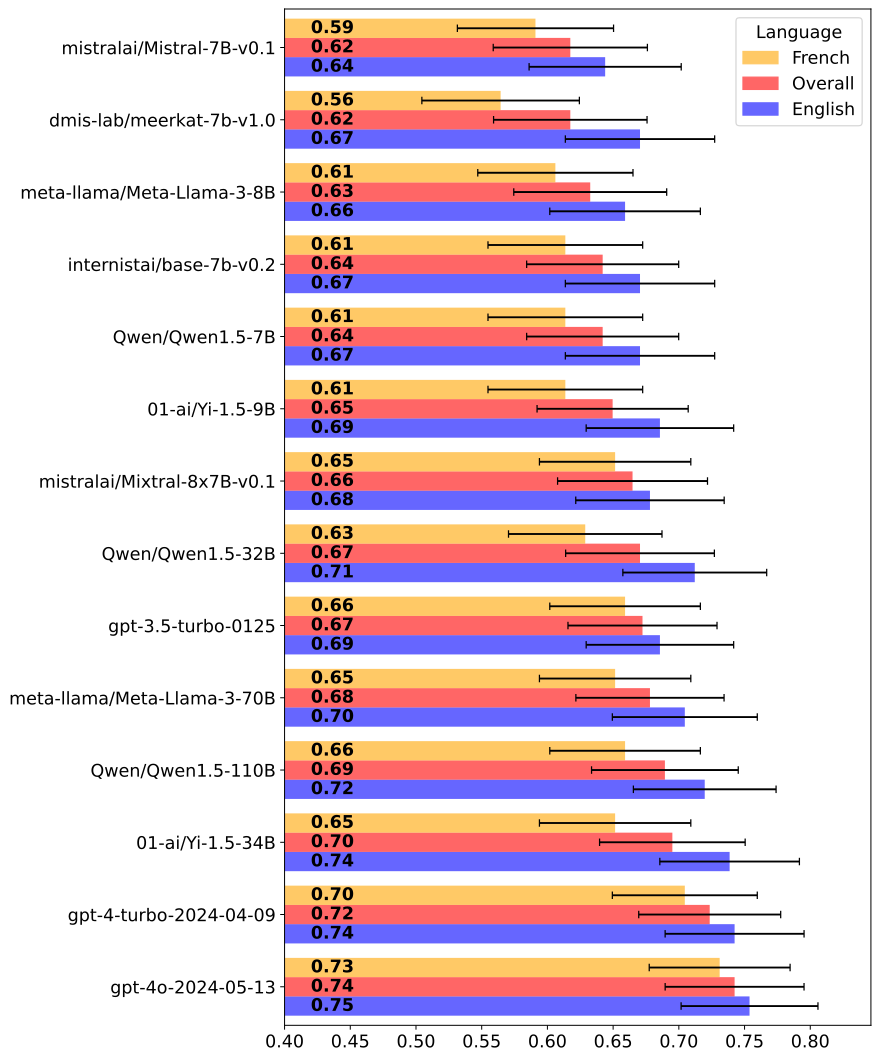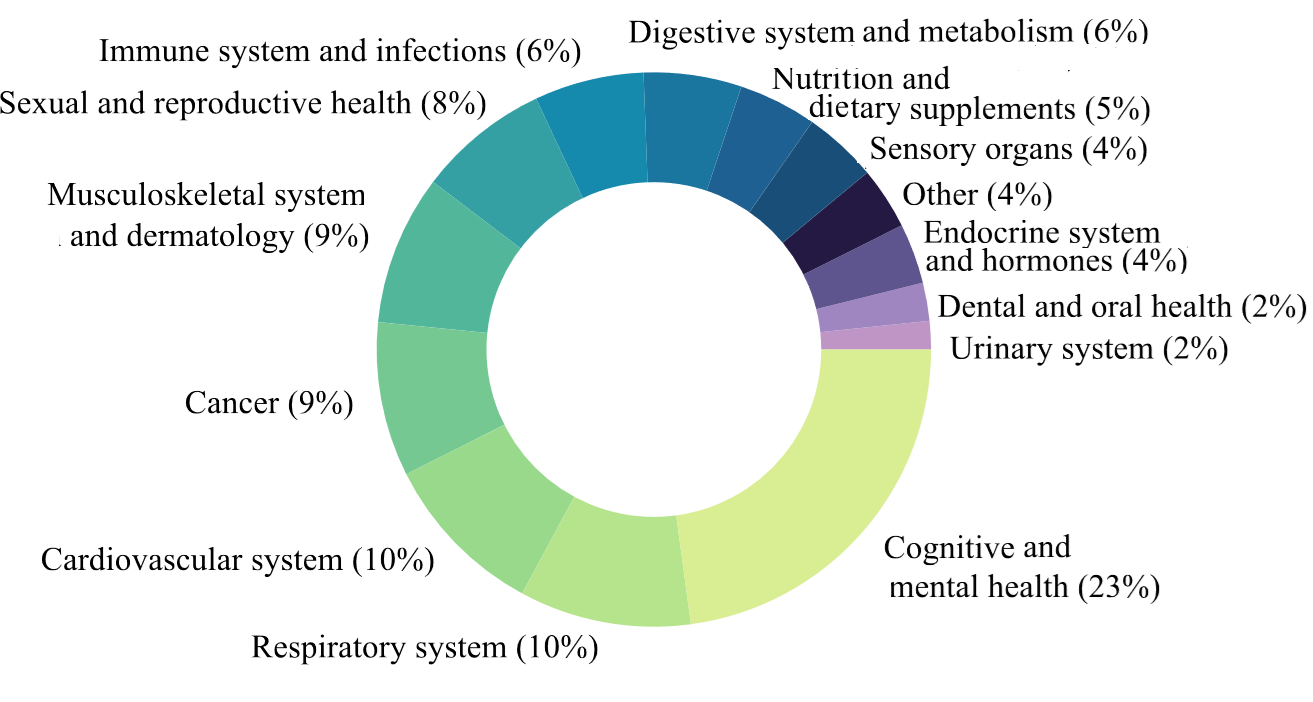Multiple Choice Questions and Large Languages Models: A Case Study with Fictional Medical Data
2406.02394

0
0

Abstract
Large Language Models (LLMs) like ChatGPT demonstrate significant potential in the medical field, often evaluated using multiple-choice questions (MCQs) similar to those found on the USMLE. Despite their prevalence in medical education, MCQs have limitations that might be exacerbated when assessing LLMs. To evaluate the effectiveness of MCQs in assessing the performance of LLMs, we developed a fictional medical benchmark focused on a non-existent gland, the Glianorex. This approach allowed us to isolate the knowledge of the LLM from its test-taking abilities. We used GPT-4 to generate a comprehensive textbook on the Glianorex in both English and French and developed corresponding multiple-choice questions in both languages. We evaluated various open-source, proprietary, and domain-specific LLMs using these questions in a zero-shot setting. The models achieved average scores around 67%, with minor performance differences between larger and smaller models. Performance was slightly higher in English than in French. Fine-tuned medical models showed some improvement over their base versions in English but not in French. The uniformly high performance across models suggests that traditional MCQ-based benchmarks may not accurately measure LLMs' clinical knowledge and reasoning abilities, instead highlighting their pattern recognition skills. This study underscores the need for more robust evaluation methods to better assess the true capabilities of LLMs in medical contexts.
Create account to get full access
Overview
- This paper explores the use of multiple choice questions (MCQs) with large language models (LLMs) in the context of fictional medical data.
- The research investigates whether MCQs can be effectively used to evaluate LLM performance and how LLMs perform on MCQs compared to humans.
- The study uses a custom dataset of fictional medical MCQs to assess the capabilities of LLMs in this domain.
Plain English Explanation
This paper looks at how well large AI language models can answer multiple choice questions about fictional medical topics. The researchers wanted to see if these types of questions could be a useful way to test the capabilities of these powerful language models, and how their performance compares to that of humans.
To do this, the researchers created a dataset of made-up medical multiple choice questions. They then had the language models try to answer these questions and compared their results to how people did on the same questions.
The key idea is that multiple choice questions could be a helpful way to evaluate how well large language models understand and reason about complex topics like healthcare, rather than just testing their ability to generate fluent text. By seeing how the models perform on these types of assessments, researchers can get a better sense of the models' true competence in specialized domains.
Technical Explanation
The paper investigates the use of multiple choice questions (MCQs) as a way to evaluate the performance of large language models (LLMs) on fictional medical data. The researchers created a custom dataset of MCQs covering various medical topics and had LLMs attempt to answer them.
The experimental design involved comparing the LLMs' performance on the MCQ task to human performance. This allowed the researchers to assess how well the LLMs can handle the reasoning and comprehension required for this type of assessment, compared to human-level capabilities.
The key architecture components were the use of standard large language models, such as GPT-3, fine-tuned on the fictional medical MCQ dataset. The researchers explored different prompting strategies to enable the LLMs to effectively engage with the MCQ format.
The main insights from the study were that LLMs were able to achieve reasonable performance on the medical MCQ task, often rivaling or even surpassing average human performance. However, the models still struggled with certain types of questions that required deeper medical knowledge or multi-step reasoning.
Critical Analysis
The paper provides a valuable case study on the potential and limitations of using MCQs to evaluate LLM capabilities in specialized domains like healthcare. The use of fictional medical data is an interesting approach, as it allows for more controlled experimentation without the risks or ethical concerns of using real patient information.
However, a potential limitation is the lack of real-world medical relevance of the fictional dataset. It's unclear how well the findings would translate to applications involving genuine medical knowledge and decision-making. Further research using more realistic medical data would be helpful to better understand the practical applications of this approach.
Additionally, the paper does not delve deeply into the specific types of reasoning or medical knowledge gaps that the LLMs struggled with. More detailed analysis of the errors and failure modes could provide additional insights to guide future model development and assessment strategies.
Conclusion
This paper presents a novel approach to evaluating large language models using multiple choice questions on fictional medical data. The results suggest that MCQs can be a useful tool for assessing LLM capabilities in specialized domains, with the models often performing on par with or better than humans on the task.
The findings have implications for the development and deployment of LLMs in healthcare and other critical sectors, where reliable assessment of model competence is crucial. By continuing to explore the strengths and limitations of LLMs on tasks like medical MCQs, researchers can work towards building more robust and trustworthy AI systems for real-world applications.
This summary was produced with help from an AI and may contain inaccuracies - check out the links to read the original source documents!
Related Papers
Can multiple-choice questions really be useful in detecting the abilities of LLMs?
Wangyue Li, Liangzhi Li, Tong Xiang, Xiao Liu, Wei Deng, Noa Garcia

0
0
Multiple-choice questions (MCQs) are widely used in the evaluation of large language models (LLMs) due to their simplicity and efficiency. However, there are concerns about whether MCQs can truly measure LLM's capabilities, particularly in knowledge-intensive scenarios where long-form generation (LFG) answers are required. The misalignment between the task and the evaluation method demands a thoughtful analysis of MCQ's efficacy, which we undertake in this paper by evaluating nine LLMs on four question-answering (QA) datasets in two languages: Chinese and English. We identify a significant issue: LLMs exhibit an order sensitivity in bilingual MCQs, favoring answers located at specific positions, i.e., the first position. We further quantify the gap between MCQs and long-form generation questions (LFGQs) by comparing their direct outputs, token logits, and embeddings. Our results reveal a relatively low correlation between answers from MCQs and LFGQs for identical questions. Additionally, we propose two methods to quantify the consistency and confidence of LLMs' output, which can be generalized to other QA evaluation benchmarks. Notably, our analysis challenges the idea that the higher the consistency, the greater the accuracy. We also find MCQs to be less reliable than LFGQs in terms of expected calibration error. Finally, the misalignment between MCQs and LFGQs is not only reflected in the evaluation performance but also in the embedding space. Our code and models can be accessed at https://github.com/Meetyou-AI-Lab/Can-MC-Evaluate-LLMs.
5/24/2024

MedREQAL: Examining Medical Knowledge Recall of Large Language Models via Question Answering
Juraj Vladika, Phillip Schneider, Florian Matthes

0
0
In recent years, Large Language Models (LLMs) have demonstrated an impressive ability to encode knowledge during pre-training on large text corpora. They can leverage this knowledge for downstream tasks like question answering (QA), even in complex areas involving health topics. Considering their high potential for facilitating clinical work in the future, understanding the quality of encoded medical knowledge and its recall in LLMs is an important step forward. In this study, we examine the capability of LLMs to exhibit medical knowledge recall by constructing a novel dataset derived from systematic reviews -- studies synthesizing evidence-based answers for specific medical questions. Through experiments on the new MedREQAL dataset, comprising question-answer pairs extracted from rigorous systematic reviews, we assess six LLMs, such as GPT and Mixtral, analyzing their classification and generation performance. Our experimental insights into LLM performance on the novel biomedical QA dataset reveal the still challenging nature of this task.
6/11/2024

Large Language Models in Healthcare: A Comprehensive Benchmark
Andrew Liu, Hongjian Zhou, Yining Hua, Omid Rohanian, Anshul Thakur, Lei Clifton, David A. Clifton

0
0
The adoption of large language models (LLMs) to assist clinicians has attracted remarkable attention. Existing works mainly adopt the close-ended question-answering (QA) task with answer options for evaluation. However, many clinical decisions involve answering open-ended questions without pre-set options. To better understand LLMs in the clinic, we construct a benchmark ClinicBench. We first collect eleven existing datasets covering diverse clinical language generation, understanding, and reasoning tasks. Furthermore, we construct six novel datasets and complex clinical tasks that are close to real-world practice, i.e., referral QA, treatment recommendation, hospitalization (long document) summarization, patient education, pharmacology QA and drug interaction for emerging drugs. We conduct an extensive evaluation of twenty-two LLMs under both zero-shot and few-shot settings. Finally, we invite medical experts to evaluate the clinical usefulness of LLMs.
6/27/2024

Beyond the Answers: Reviewing the Rationality of Multiple Choice Question Answering for the Evaluation of Large Language Models
Haochun Wang, Sendong Zhao, Zewen Qiang, Nuwa Xi, Bing Qin, Ting Liu

0
0
In the field of natural language processing (NLP), Large Language Models (LLMs) have precipitated a paradigm shift, markedly enhancing performance in natural language generation tasks. Despite these advancements, the comprehensive evaluation of LLMs remains an inevitable challenge for the community. Recently, the utilization of Multiple Choice Question Answering (MCQA) as a benchmark for LLMs has gained considerable traction. This study first investigates the limitations of MCQA as an evaluation method for LLMs and then analyzes the fundamental reason for the limitations of MCQA, that while LLMs may select the correct answers, it is possible that they also recognize other wrong options as correct. Finally, we propose a dataset augmenting method for Multiple-Choice Questions (MCQs), MCQA+, that can more accurately reflect the performance of the model, which underscores the need for more robust evaluation mechanisms in assessing the performance of LLMs.
5/31/2024